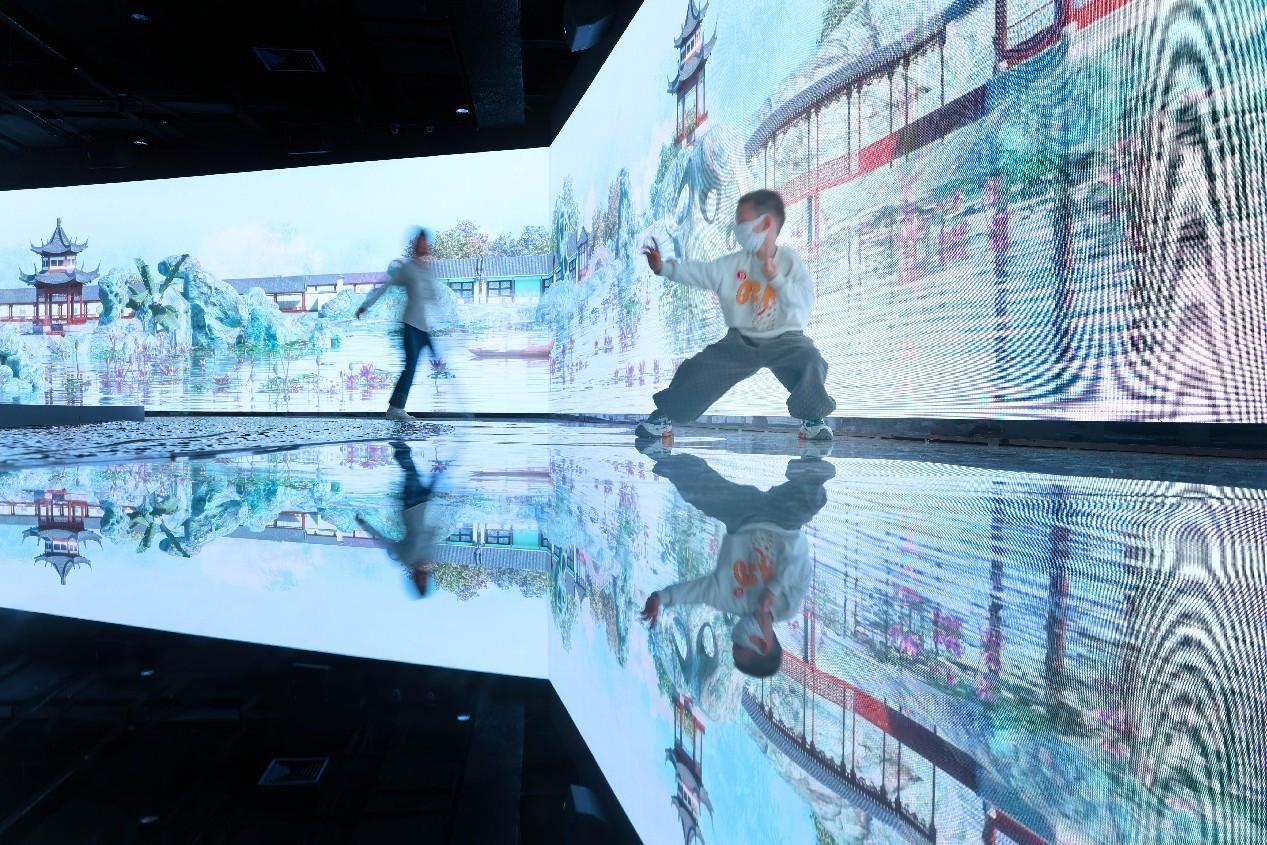5G technology unleashes new potential of modern tourism

Autopilot new energy buses run in a scenic spot in Xiangyang, central China's Hubei province. (People's Daily Online/Yang Dong)
"I just played a live action role-playing (LARP) game in the Miao village to experience the culture of the Miao ethnic group. It was so fun," said a woman surnamed Zhao while visiting Xijiang Qianhu Miao Village, a tourist site that displays an epic about the development of the Miao ethnic group in southwest China's Guizhou province.
The LARP game, launched by the tourist site, presents the ancient and traditional Miao legends through modern technologies such as 5G and mixed reality (MR), and enables tourists to see virtual sceneries and treasures in the physical world with a pair of MR goggles.
According to Luo Longbao, head of the marketing department of the company that manages the tourist site, the Xijiang Qianhu Miao Village has built a 5G platform that offers various types of services.
"On the intelligent platform, tourists can not only check the real-time map of the village, but also search for parking space, introduction to scenic spots and recommended routes," Luo told People's Daily, adding that the platform offers tourists with whole-process services.
As new information technologies are more and more employed in the culture and tourism industry, 5G intelligent tourism scenarios are emerging across China, such as 5G smart tour guide, 5G virtual reality and augmented reality tourism programs, online sightseeing and livestream tourism. These scenarios are providing tourists with richer and newer experiences.

A technician maintains intelligent tourism equipment in a scenic spot in Bijie, southwest China's Guizhou province. (People's Daily Online/Han Xianpu)
Intelligent upgrading of tourist sites and resorts makes tours more interesting and convenient for tourists. It also leads to more efficient and smarter management of scenic areas.
Thanks to the application of 5G, Internet of Things (IoT) and other technologies, facilities in Kuanzhai Alley, an ancient street left over from the Qing Dynasty (1644-1911) in Chengdu, southwest China's Sichuan province, have grown smarter.
For instance, infrared sensors are installed in public toilets to see whether they are occupied and to estimate daily foot traffic, which makes the distribution of sanitation workers more reasonable. The tourist site has built a street lamp control system that captures the status of each street lamp and identifies whether there are damaged street lamps. Besides, the trash cans in Kuanzhai Alley, assisted by IoT technology, would immediately inform relevant staff members once they are full.
The application of 5G, IoT, big data, cloud computing, artificial intelligence, block chain, ultra-high-definition video and digital twin technologies, as well as the building of 5G intelligent tourism real-time monitoring and emergency response platforms, can effectively strengthen the tourism industry's capability in monitoring, risk control, regulation and emergency response, and better the management of 5G intelligent tourism.
Xin Hongye, deputy director of the information center of the Ministry of Culture and Tourism, told People's Daily that the intelligent upgrading of the tourism industry calls for organic integration of technologies and the industry, so that technologies can practically solve the pain points in the development of the industry.

People visit the Suzhou Bay Digital Art Museum in east China's Jiangsu province to experience the charm of digital technologies. (People's Daily Online/Xu Congjun)
Popular tourist sites are always confronted with poor network connection during peak seasons as there are too many visitors, which seriously affects visitors' experience.
"Poor network connection used to be the biggest headache for tourist sites," said Shen Kaijun, deputy general manager of a tourism company in Bijie, Guizhou province. According to him, it is the construction of 5G intelligent tourism platforms that has helped scenic spots achieve full network coverage of 5G and wifi, attract more tourists and gain higher recognition.
Professor Li Xinjian with the School of Tourism Sciences, Beijing International Studies University, told People's Daily that the digitalization helps upgrade traditional tourist sites and represents an inexorable trend of digital economy contributing to the high-quality development of the tourism industry.
Building digital tourist sites not only helps better protect and display cultural relics and improve tourist sites' capability in operation and emergency response, but also further facilitates tourists and improve their satisfaction. It is indispensable to the modernization of tourist sites.
Photos
Related Stories
Copyright © 2023 People's Daily Online. All Rights Reserved.









